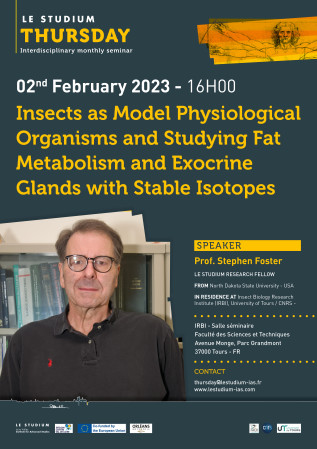Stephen Foster

From
North Dakota State University - USA
In residence at
Insect Biology Research Institute (IRBI), University of Tours / CNRS - FR
Host scientist
Jérôme Casas
BIOGRAPHY
Steve Foster was awarded a PhD in chemistry at the University of Waikato (New Zealand). Afterwards, he obtained a position at the Entomology Division of DSIR in Auckland (New Zealand) where he worked on insect chemical ecology until accepting a position in the Department of Entomology at North Dakota State University (USA) in 2000. He is a professor in entomology (School of Natural Resource Sciences) at NDSU, where he teaches Insect Physiology and works primarily on the metabolic nature of insect chemical communication. In recent years his research has focused on the use of stable isotope tracers to study quantitative metabolism in insects. He has been an Associate Editor for the Journal of Chemical Ecology since 2006 and is a past President and Secretary of the International Society of Chemical Ecology.
PROJECT
Stable isotope methods for insect physiology
In terms of number of species and total biomass, insects are probably the most successful group of animals on the planet. We know them as impacting our lives in both positive and negative ways, e.g., as crop pollinators or crop pests. One reason for the success of insects is their extraordinary ability to utilize nutrients in order to increase their reproduction. Although broad patterns of nutrient use for reproduction have been established, studies on the direct usage of nutrients in specific reproductive physiologies of insects are less common. In part, this is because there is a paucity of convenient methods available for studying the allocation of nutrients to specific insect physiologies. In this proposal, we aim to combine the complementary skills of the applicant and host to develop specific stable isotope tracer/tracee methods for studying quantitative nutrient allocation to insect physiologies. The use of stable over radioactive isotope tracer methods has numerous advantages, including handling convenience, waste disposal and the use of nondedicated laboratory facilities. During the duration of this proposal, we will develop methods that will allow us to determine: (1) the production,storage and release of sex attractant (pheromone) in moths and (2) how parasitoid wasps use nutrients obtained from host feeding for metabolism and reproduction. In addition to providing stable isotope tracer/tracer tools for studying insect physiologies and metabolism, the work will add to our knowledge of sustainable pest control methods using behavior-modifying chemicals (semiochemicals) and biological control.
Publications
Final reports
Insects are successful largely because they are highly efficient at optimizing nutrients for reproduction. To understand this efficiency, we have used the stable isotope tracer-tracee-based technique mass isotopomer distribution analysis (MIDA) to follow metabolic allocation in insects in vivo. Based largely on application of these techniques, we had three aims during the fellowship:
a) To adapt MIDA to study allocation of carbohydrates acquired during host feeding by the parasitoid Eupelmus vuiletti to fat production.
b) To study sex pheromone storage in a moth (Bombyx mori).
c) To write a significant, high impact review on insect physiology.
We successfully adapted MIDA to study fat acquisition in E. vuiletti. Essentially, females allowed to feed on a glucose drop, turned over their hemolymph trehalose substantially (ca. 30-40%). However, very little of this acquired sugar was converted to fat. Moreover, isotopic enrichment of fat was substantially less than that of the trehalose, indicating that other (non-labeled) sources of precursor are used for this fat synthesis. This supports the finding that parasitoids can synthesize fat, but only in very small amounts in comparison to their carbohydrate acquisition. These techniques were transferred to staff and students at IRBI.
Problems with supply of insects meant that we could not fully study sex pheromone storag in B. mori. However, we were able to demonstrate that females, when synthesizing pheromone, stored most pheromone on the gland cuticular surface, rather than intracellularly, thereby facilitating emission of pheromone.
Finally, we wrote and submitted a proposal for a review on insect exocrine glands for the highly prestigious Annual Review of Entomology (2022 IF = 23.8). We were notified of the success of our proposal in December 2022. Thereafter , a considerable portion of the visit was dedicated to researching, synthesizing, and writing this review. The manuscript will be submitted in January 2024 and, hopefully, published in January 2025.

